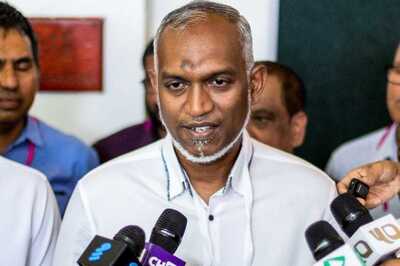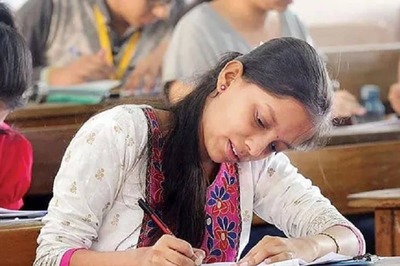
views
The subject of Kashmir makes Hindi filmmakers uneasy, and they don’t tread much beyond the obvious path. There are two ways of representing it— Kashmir is either the hotbed of terrorism or the perfect backdrop for romantic songs.
There are only a handful of Indian filmmakers who delved into Kahsmir’s uneasy chapters. Among them, one is Rahul Dholakia, whose Lamhaa (2010) narrates the story of political conflict and civilian struggle in the Valley. He talks about the “missing” Kashmir in Indian cinema, what’s stopping us from exploring new angles, and the areas where we still continue to be a hypocrite.
Edited excerpts:
In the aftermath of Pulwama attack, the environment has become very charged. Some people are even asking for war. As someone who has closely dealt with the subject of Kashmir conflict on screen, what do you have to say about the current situation in the country and how have you been processing it?
We are going through a phase of ‘nationalism.’ This is more so after 2014. The unfortunate part of this is that most of us have neither seen a war nor do we know anyone who went to war or lost their lives. To be honest, the wars we fought -- be it Kargil or even 1971, we as citizens never had to sacrifice anything. So, it’s easy to shout: ‘Go To War,’ because we have never paid the price of war. What happened in Pulwama was horrible. It should never have happened. But then to react by attacking Kashmiri students is so stupid and uncalled for. If Kashmir is a part of India, and everyone is fighting for ‘our’ Kashmir then, ‘Why are you beating up Kashmiris?’”
It's tough to articulate the life of an ordinary Kashmiri. What was your experience like shooting Lamhaa...
I was there in 2008-10. Most of the time the state was under Governor’s Rule. During my stay, I met almost everyone from Asiya Andrabi (Kashmiri separatist leader) and (Yousaf Raza) Gilani to Mirwaiz (Umar Farooq) and Shabir Ahmed Shah. I also interacted with some people who were serving in prisons and were out on parole, students and the common person, and with a lot of J&K police, CRPF chiefs and jawans and made some great friends in the Army.
Now, this is what I saw:
Most Kashmiris are not against Indians. They are against the Armed Forces. They are ‘not’ pro Pakistan, because they have seen that side and it’s not attractive.
The Kashmiris are peaceful and extremely hospitable people. But there is one whole generation which has grown up since 1990, where they have only heard bullets and bad things about India. They have seen atrocities created by the men in green, and quite honestly, they don’t know or don’t care if they are Ikhwan, CRPF or Army. For them, these are the people who are the jailors in their ‘beautiful prison.’
I don’t blame them entirely. I have myself witnessed ‘random’ crackdowns in the streets of Kashmir, where at any time of the day, the Forces (CRPF mainly) would block the roads, line up civilians, and frisk them. I don’t know whether they still do it, now, but they did it at the time and it was done for over 20 years.
Every morning a patrol party has to check the roads for IED’S. This is done by our forces, and once that’s done, only then the roads open for people and or convoys. Imagine the fear or the psychological impact (on everyone in Kashmir, including our army), when you don’t know if a landmine or an explosive will blow you off. This is done daily.
There are so many Kashmiri men who are missing and the police or the Army has no trace of them. They could be shot, maybe languishing in jails or could have crossed over to Pakistan; one never knows.
Now, as far as our forces are concerned, they too are in a bad situation. First of all, they can never tell the difference between a common man and a militant. The conditions in Kashmir are harsh. The winters can be brutally cold, and I will be honest, our forces have the most pathetic facilities. Archaic heaters, uncomfortable bunkers, most of them have no entertainment and or sub-standard equipment and clothing. I mean it’s probably a miracle as to how they are so motivated.
And we so easily forget the psychological aspect of it all. These guys are fighting for their lives every second for months without leave. Do we even respect them outside the world of social media? The jawans would tell me when they would go to their hometowns, they always had to go unreserved, because rarely can you plan your leave if you are posted in Kashmir. They would have to bribe a TC so that they could get a place to sit.
So, Kashmir was a ‘jannat’ (heaven). But, like I say in ‘Lamhaa’, ‘Jannat aur Jahnnum ke beech ka faasla sirf ek goli hai.’
If there is one thing which is sidelined during this whole "thirst for revenge" scenario which has now been going on for decades, it's the basic human rights of Kashmiris. Your view.
I agree. I had met a lady in Kashmir called Parveena Ahanger. She is the Founder and Chairperson of Association of Parents of Disappeared Persons (APDP). These are people whose family members are missing for years. She started it because she was looking for her husband who was picked up by the forces and never returned. She went to every jail in India and never got an answer. Shernaz Patel’s character in ‘Lamhaa’ was loosely inspired by her.
There is a whole town of over 500 women called Dardpura, it’s a town of half-widows. These ladies can neither remarry nor are they entitled to any inheritance as their husbands are missing but not declared dead.
The orphanages are full and though NGOs try and help, they, too, are limited in their resources. Not to forget crackdowns at any time and abuse from both forces and the Militants. How can we forget that? Even if they don’t want to help or support the militants, they are forced to. Once they are done, our intel officers pick them up and obviously question them because who is to tell whether this is a genuine person or an operative. So the biggest casualty in this is the Kashmiri who wants to live in peace.
We talk so much about the Kashmir conflict but when it comes to its depiction on screen, the state has somewhat been only confined to a cliché for beauty in the Indian cinema.
First, we were worried about the box office. Then we started worrying about the ban. Now we are worried about being trolled and called ‘anti-national’. So we shy away from addressing the real issues. We tried to tell a bit of the story in ‘Lamhaa,’ but I think even that was diluted. In fact, it was banned in mid-eastern countries because they felt ‘how can a woman speak up against the system?’
I think Pakistan banned it because we showed Lashkar-e-Taiba and ISI directly involved in Kashmir violence. While shooting my entire team was locked up and I was held hostage for over four hours by over 1000 people because they thought we were maligning Kashmir.
Forget Kashmir, when did we even make a good enough film on the (Kashmiri) Pandits? I have been to Jammu refugee camps and have spoken to the displaced Pandits. I got to know that more people have died of snake bites there than of bullets in the valley. They were angry with all those who would speak about the plight of the Pandits during the elections and then forgot about it. Most of these people had ‘kothis’ in the valley and now they were in 10x10 rooms. Their houses were either taken over by Kashmiri Muslims or mainly by our forces to make bunkers.
Which are the areas in cinema where we still continue to be a hypocrite in so many other ways?
Forget the cinema, we are so guarded when we tweet or make any statements. Look what happened to Shah Rukh (Khan) and Aamir (Khan). But then when I made ‘Parzania’, the reason why I think I could do it that way, was because I was living in America. In India, it’s the people around you who scare you, dissuade you and then you start finding the easy way out. The businessman in you starts negotiating with the artiste in you. End result is you neither get box office nor the National Award. So, if we are to take up such issues, do it with conviction.
Also to be fair to filmmakers, we have to face so many obstacles right from the Censor Board to political parties to anyone with a personal agenda.
Do you think Indian cinema has been a success in conveying war is not to be celebrated and how human lives are affected by it?
Honestly, no. When did we ever make a war film? In all our films, the enemy is stupid. They have neither knowledge nor power or equipment. We never go beyond the physical fight. The mind of the soldier and the trauma both physical and psychological or human interest stories are rarely explored. The films coming out of America, like ‘Saving Private Ryan’ or ‘Dunkirk’ even ‘Black Hawk Down’, ‘Apocalypse Now’ and ‘Merry Christmas, Mr. Lawrence’ have so much depth and pain and purpose.
What according to you should be the purpose of a war film?
It should show the price of war. The impact it has on the people that go to fight. The Families. The integrity, and character. The Bonding and the consequences. It has to reflect pain, suffering, but also hope- a perspective on life like in ‘Life is Beautiful.’ Because in war, there are no winners only losers. Just look at history--Vietnam war, Gulf war, and even the 1971 war, directly or indirectly, Kashmir is affected because of it.
(This interview was conducted before the IAF strike on Balakot).
Follow @News18Movies for more




















Comments
0 comment